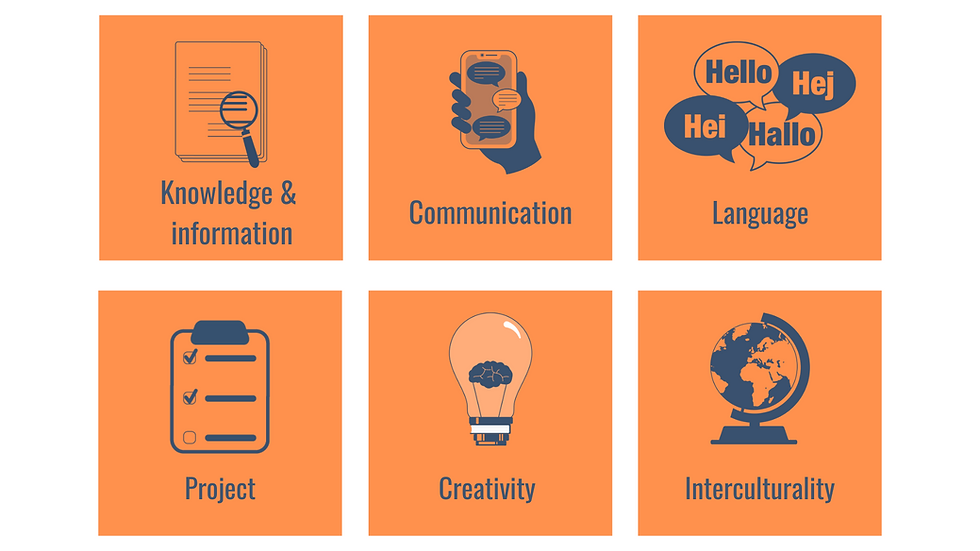Learn how to integrate skills information into your course design
- Anna Suutarla

- Nov 8, 2022
- 3 min read
Updated: Aug 15, 2023
University teaching staff are in a unique position to facilitate the transition of humanities graduates into working life. By giving students the vocabulary to describe the skills they acquire in courses, students are better equipped to tell about their skills and abilities in job applications and interviews. Having a better understanding of their skills also helps humanities graduates identify suitable job opportunities and ultimately find employment in positions that match their skill sets.

Research indicates that the perceptions students hold about their skills and their ability to tell others about their competences greatly determine the quality of their transition to working life. Therefore, it is important for teachers to identify the skills students acquire in their courses and to integrate information on skills into their course design.
Participating in the H-Highlight workshop offers teachers the opportunity to assess their course design in terms of skills. The H-Highlight workshop is based on the ABC Learning Design, a hands-on curriculum development workshop developed at University College London. Workshop participants create a visual ‘storyboard’ of their course design. The H-Highlight teacher training works from the premises that teachers already impart many skills to students through the disciplinary focus. Workshop participants are not asked to add new content or generic skills to their classes.

Trainer Catho Jacobs has five tips for teaching staff interested in integrating skills information into their course design
1. Take the course’s strengths as your starting point
‘Teaching staff should take the strengths of their course and the discipline’s approach as their starting point,’ says Jacobs. ‘It’s important to emphasise that we don’t want them to unnecessarily add extra skills to their course. Our philosophy is that they already naturally impart many of the skills that students need for the job market,’ she explains. ‘The main point is the course’s inherent value and how the teachers make use of that value.’
2. Identify the skills students acquire in your course
Look at your course content through the eyes of a student. What skills do students develop by taking part in class and doing the assignments? The humanities profile is a great resource to help you start thinking in terms of skills. It is research-based and showcases skills specific to humanities graduates that are valuable in working life. The skills profile lists 70 detailed descriptions of skills that are organized into six categories: knowledge & information, communication, language, project, creativity and interculturality.

3. Think about learning activities in terms of skills
‘For example, is it a lecture or a tutorial? If you change the learning activities, you can increase or decrease the emphasis on skills in certain clusters. Lectures are helpful for skills in the knowledge cluster, because students have to process a lot of information simultaneously. If you turn the lecture into a tutorial, for example, there will be greater emphasis on skills in the communication cluster.’
4. Talk about skills with your students
Once you have identified the skills that are emphasised in your courses, it is important to communicate about them with your students. The best way to do this depends on your personal preferences. ‘There’s no right or wrong way of going about this,’ says Jacobs. ‘Some teachers prefer to give a rough outline of the skills at the beginning or end of a course, or you can specifically state them for every relevant project or lecture.’ Watch the video below for more tips on how to communicate about skills to students.
5. Consult the ASSET-H team
Catho reminds teaching staff to get in touch if they have any questions about integrating skills into their course design. You can contact any ASSET-H team member directly or send a message with the website contact form.
Article is based on interview of Catho Jacobs done by Laura van der Hauw originally published on 14 July 2022 on the University of Leiden website: How can I help my students to recognise their unique skills?



Los vinilos decorativos son una solución práctica, versátil y elegante para transformar cualquier espacio. Ideales para hogares, oficinas, comercios y espacios deportivos, permiten personalizar paredes, cristales, baños, muebles y zonas especiales sin necesidad de reformas complicadas. Su facilidad de instalación, variedad de diseños y adaptabilidad los convierte en la opción perfecta para cualquier estilo de decoración.
Vinilos decorativos para paredes
Decorar las paredes con vinilos es una de las formas más efectivas de cambiar la estética de cualquier habitación. Los vinilos decorativos para paredes de cocina modernos grandes son ideales para cocinas amplias y modernas, combinando diseño, color y funcionalidad sin necesidad de grandes reformas. Además, el catálogo de vinilos decorativos para paredes ofrece opciones para todas las estancias, desde salones y…
Everyone learns differently, and knowing your own preference can make studying and work so much easier. If you want to find out if you're a visual, auditory, or kinesthetic learner, a fun Learning Style quiz can give you personalized strategies for success.